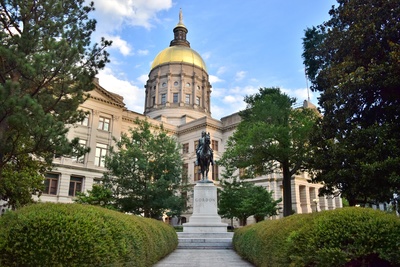Very early on Saturday morning, the Indiana General Assembly passed a long-awaited transportation funding bill (
IN HB 1002) that is expected to raise an additional $6.4 billion over the next seven years to build and maintain the state's roads and bridges. The legislation passed quickly on the last day of session after House and Senate leaders announced last week they had reached a deal on a transportation funding package.
The last time Indiana raised the state's fuel tax was in 2003 when the legislature raised the rate 3-cents to to 18-cents-per-gallon.
As aspects of the legislation are implemented over the next seven years, the state will gradually ramp up new revenues that it will invest in the state's transportation infrastructure. New revenues will rise to $1.8 billion in annual revenue by 2024 and should add $617 million to road funding in 2018 alone. On average, the legislation will raise close to the $1.2 billion per year for additional state and local road funding needs.
In total, the legislation is expected to raise $6.4 billion in new revenue over the next seven years by:
- Increasing the motor fuel tax 10 cents-per-gallon (starting July 1, 2017).
- Indexing the motor fuel tax to inflation for the next seven years with a cap of 1-cent increase per year.
- Establishing a new $50 annual “infrastructure improvement fee” for hybrid vehicle registration and $150 for electric vehicles.
- Establishing a new $15 annual “infrastructure improvement fee” and increasing registration fees by 25 percent for trucks over 26,000 pounds.
- Gradually shifting sales tax on gasoline purchases from the General Fund to the State Highway Fund (starting in 2022).
The legislation also directs the state transportation department to study tolling and submit a waiver to the federal government to allow tolling of existing interstates. Currently, states are
banned from tolling existing interstate highways outside a few exceptions.
Governor Eric Holcomb (R) is expected the sign HB 1002 into law. In a
statement released after the agreement was announced, the governor congratulated state lawmakers involved in the deal and said the plan “provides the tools necessary to maintain what we have, finish what we started, and invest in the future.”
The Indiana Chamber of Commerce, which named HB 1002 as the organization's top legislative priority this session, also praised the legislation. “We are very pleased to see such a substantial long-term funding plan to address the many maintenance and new construction needs that exist throughout our state,”
said Chamber President and CEO Kevin Brinegar.
Indiana Joins California as 18th and 19th States to Raise Fuel Taxes Since 2012
Indiana follows California to become the second state this session to pass a fuel tax increase. The California gas tax increase won't take effect until November, but Indiana will implement its gas tax increase in July, therefore Indiana will become the 18th and California the 19th states to raise its fuel taxes since 2012. State lawmakers are significantly more likely to pass a gas tax increase during a non-election year, so expectations are set for a big year in new transportation investment in 2017.
What's Driving this Trend?
Policymakers are increasingly faced with a stark reality: Costs to build and maintain the country's transportation infrastructure — namely our roads and bridges — are on the rise, and the way we typically pay for that investment is raising fewer funds than necessary. Fuel tax revenues, the primary financing mechanism for state transportation projects, are eroding substantially. Fuel tax rates in most states are not indexed to inflation, and lawmakers
in most states have not raised fixed per-gallon rates for years. The same can be said for the federal gas tax. Other factors contributing to the gas tax’s growing ineffectiveness include more fuel-efficient vehicles thanks to
federal Corporate Average Fuel Economy standards putting pressure on manufacturers, plus more electric and hybrid cars on the roads, which pay little, if any, gas taxes. Left with few options but to raise an unpopular gas tax, states are desperately
searching for alternative transportation revenue sources.
-6d814b-400px.jpeg)

-6d814b-400px.jpeg)

